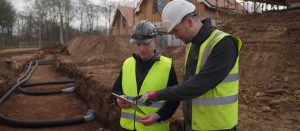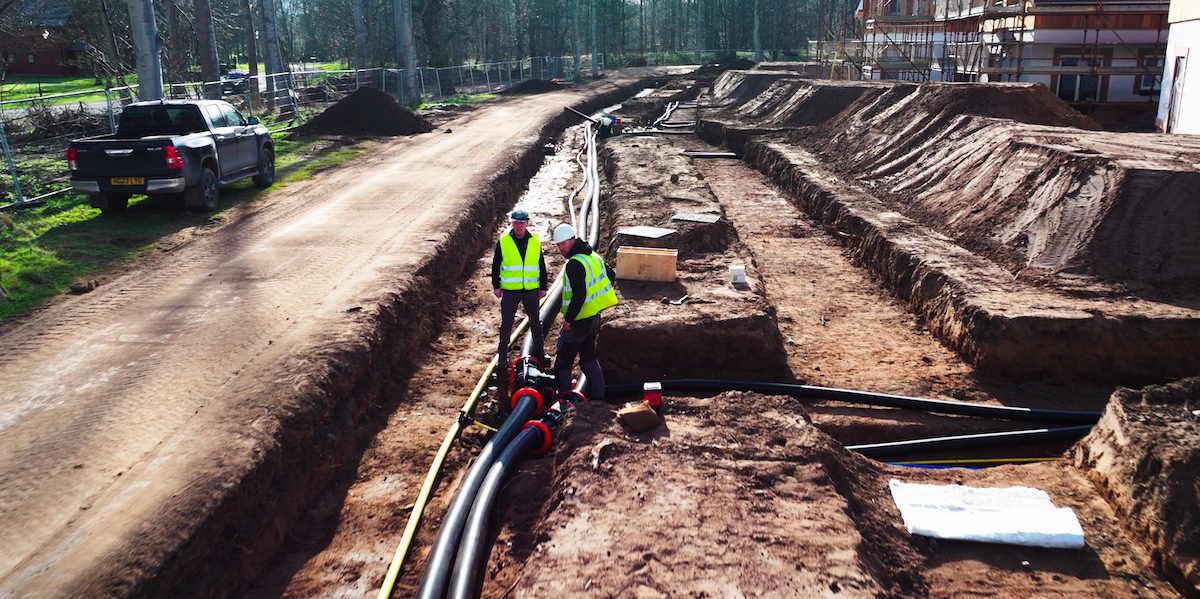REHAU is highlighting a major opportunity for utility contractors to diversify into the growing district heating market, as the UK Government’s latest £7 million investment into 49 heat network projects signals accelerating demand for low-carbon infrastructure.
This momentum is reinforced by the long-awaited Future Homes Standard driving low carbon heating from this Autumn, underlining the long-term direction and scale of opportunity for contractors to engage with this transition from fossil fuels.
For utility contractors experienced in pipe installations, this shift presents a timely and lucrative opportunity – especially given the Government’s commitment to build 1.5 million homes over the current parliament. However, unfamiliarity with district heating and jointing methods may be holding some back from engaging with this growing sector.
 “Utility contractors already have the core competencies needed for district heating, especially when it comes to experience of installing pipes in trenches,” says Steve Richmond, Sales and Marketing Director at REHAU Building Solutions. “What’s needed now is confidence. With the right knowledge and support from the supply chain, contractors can diversify into this growing market and unlock valuable new project opportunities. When tendering for these projects, they are increasingly likely to come across a district heating system specified.”
“Utility contractors already have the core competencies needed for district heating, especially when it comes to experience of installing pipes in trenches,” says Steve Richmond, Sales and Marketing Director at REHAU Building Solutions. “What’s needed now is confidence. With the right knowledge and support from the supply chain, contractors can diversify into this growing market and unlock valuable new project opportunities. When tendering for these projects, they are increasingly likely to come across a district heating system specified.”
 REHAU is encouraging contractors to explore how their existing skills and knowledge can be adapted to meet the demands of modern heat networks. From compression sleeve systems such as the company’s EVERLOC technology, to insulating shrouds and to electrofusion and butt-welding techniques, there are multiple jointing options and technologies available to suit different project types, site conditions and some of these techniques are likely already familiar to utility contractors. Handling large coils of gas or water main pipework on site is also similar to handling coils of polymer district heating pipework.
REHAU is encouraging contractors to explore how their existing skills and knowledge can be adapted to meet the demands of modern heat networks. From compression sleeve systems such as the company’s EVERLOC technology, to insulating shrouds and to electrofusion and butt-welding techniques, there are multiple jointing options and technologies available to suit different project types, site conditions and some of these techniques are likely already familiar to utility contractors. Handling large coils of gas or water main pipework on site is also similar to handling coils of polymer district heating pipework.
Understanding these technologies is key to delivering efficient, future-proofed installations and could prove invaluable at a time when the construction industry is experiencing acute skills shortages. With the Construction Industry Training Board suggesting a shortfall of 239,300 workers to hit the Government’s housing target, developing skillsets in pre-insulated district heating pipe installation could help utility contractors win additional project work, instead of potentially having to sub-contract this part of their overall package.
“With the scale of the housing development and decarbonisation targets we’re facing, utility contractors are going to be absolutely vital in delivering the infrastructure needed,” he concludes. “Skills shortages only add to the pressure, which is why it’s so important for professionals across the sector to upskill and adapt to the changes in utility needs for construction sites, to continue offering a complete solution.
“This is somewhere where the supply chain is well-equipped to offer support. To that end, REHAU offers an in-depth installer training course on installing polymer district heating pipework. This can be done at REHAU’s Manchester office or at the contractor’s own premises. Once this is successfully completed, this would make a utility contractor accredited to install REHAU district heating pipework. Through initiatives such as these, contractors can build the confidence they need to deliver these increasingly popular systems and further boost their business.”
Find out more about district heating.




